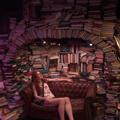matthewmincher reviewed Dracula by Bram Stoker (Vintage Classics)
The Count
4 stars
An easy read, dripping with atmosphere and history.
Told by a collection of characters, you try to guess and put together what is happening in real time. Dracula himself featured less than I expected, but was somehow also omnipresent.
I think I enjoyed the opening from Jonathan's point of view the most - though it was cool to meet Van Helsing later.
Listening to the notes after the book, I have to say a lot of the obvious (in retrospect) themes completely passed me by, so perhaps one to reread.
An easy read, dripping with atmosphere and history.
Told by a collection of characters, you try to guess and put together what is happening in real time. Dracula himself featured less than I expected, but was somehow also omnipresent.
I think I enjoyed the opening from Jonathan's point of view the most - though it was cool to meet Van Helsing later.
Listening to the notes after the book, I have to say a lot of the obvious (in retrospect) themes completely passed me by, so perhaps one to reread.












